七年级英语下册第二单元知识点归纳Unit2单元归纳资料
七下英语第二单元笔记
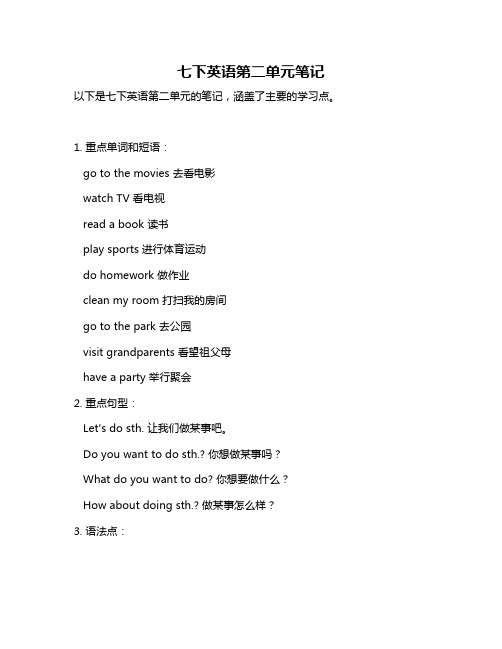
七下英语第二单元笔记以下是七下英语第二单元的笔记,涵盖了主要的学习点。
1. 重点单词和短语:go to the movies 去看电影watch TV 看电视read a book 读书play sports 进行体育运动do homework 做作业clean my room 打扫我的房间go to the park 去公园visit grandparents 看望祖父母have a party 举行聚会2. 重点句型:Let's do sth. 让我们做某事吧。
Do you want to do sth.? 你想做某事吗?What do you want to do? 你想要做什么?How about doing sth.? 做某事怎么样?3. 语法点:现在进行时态(Present Continuous Tense):表示正在进行的动作或正在发生的事情。
结构为“be动词(am/is/are)+动词的现在分词(ing形式)”。
例如:I am watching TV.(我正在看电视。
)动词的ing形式的构成:大多数动词在词尾加“-ing”,如“watching”;以不发音的字母e结尾的动词,先去掉e再加“-ing”,如“reading”;以重读闭音节结尾的动词,如果末尾只有一个辅音字母,应先双写这个字母再加“-ing”,如“running”。
4. 学习建议:结合教材中的对话和活动,多练习使用重点单词和短语,提高口语表达能力。
注意现在进行时态的用法,掌握其基本结构和变体形式,以便在实际语境中运用自如。
除了教材中的例句,可以自己尝试造句,锻炼语言组织能力。
结合个人生活实际,思考自己经常做的事情,用英语表达出来,提高实际应用能力。
牛津译林英语七年级英语下册unit2neighbours知识点归纳

一、知识要点1.Where are you going?你打算去哪里?be going此处为“现在进行时表将来”。
现在进行时表将来主要用于表示按计划或安排将要发生的动作,常有“意图”“安排”或“打算”的含义。
这种现在进行时比较生动,给人一种期待感。
go, come, leave等表示位移的动词,都可以用于现在进行时表将来。
例如:He is going. 他要走了。
I’m coming. 我要来了。
Tom is leaving. 汤姆要走了。
2. I’m going to vi sit our new neighbours.我打算拜访我们的新邻居。
be going to意为“计划,打算”,后接动词原形,用于表将来。
例如:I’m going to wash the car if I have time. 若有时间我想洗洗车。
Where are we going to stay tonight? 我们今晚住哪里?3. I’m afraid they won’t welcome visitors like you.恐怕他们不会欢迎像你一样的拜访者。
(1)welcome作及物动词,意为“欢迎’’,可与介‘词to连用;也可作形容词,意为“受欢迎的"。
如:Welcome you to our school! 欢迎到我们学校来!You’re welcome.不用谢。
(2)句中like是介词,意为“像,相似’’,其反义词是unlike;作动词时,意为“喜欢’’,后可接动名词或不定式作宾语。
如:What is Jim like? 吉姆这个人怎么样?They like playing football on Sunday.他们喜欢在星期天踢足球。
(3)won’t是will与not的缩略形式。
“will+动词原形"也是一般将来时的构成之一。
如:We will take a bus to work.我们将乘公共汽车上班。
人教版初一七年级英语(下)第二单元Unit2知识点+语法整合
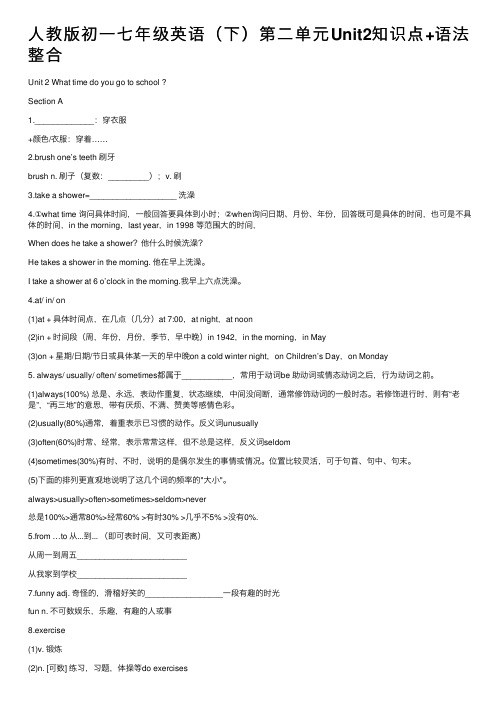
⼈教版初⼀七年级英语(下)第⼆单元Unit2知识点+语法整合Unit 2 What time do you go to school ?Section A1._____________:穿⾐服+颜⾊/⾐服:穿着……2.brush one’s teeth 刷⽛brush n. 刷⼦(复数:_________);v. 刷3.take a shower=___________________ 洗澡4.①what time 询问具体时间,⼀般回答要具体到⼩时;②when询问⽇期、⽉份、年份,回答既可是具体的时间,也可是不具体的时间,in the morning,last year,in 1998 等范围⼤的时间,When does he take a shower?他什么时候洗澡?He takes a shower in the morning. 他在早上洗澡。
I take a shower at 6 o’clock in the morning.我早上六点洗澡。
4.at/ in/ on(1)at + 具体时间点,在⼏点(⼏分)at 7:00,at night,at noon(2)in + 时间段(周,年份,⽉份,季节,早中晚)in 1942,in the morning,in May(3)on + 星期/⽇期/节⽇或具体某⼀天的早中晚on a cold winter night,on Children’s Day,on Monday5. always/ usually/ often/ sometimes都属于___________,常⽤于动词be 助动词或情态动词之后,⾏为动词之前。
(1)always(100%) 总是、永远,表动作重复,状态继续,中间没间断,通常修饰动词的⼀般时态。
若修饰进⾏时,则有“⽼是”,“再三地”的意思,带有厌烦、不满、赞美等感情⾊彩。
(2)usually(80%)通常,着重表⽰已习惯的动作。
译林版牛津英语七年级下册全册Unit2单元知识点及语法归纳
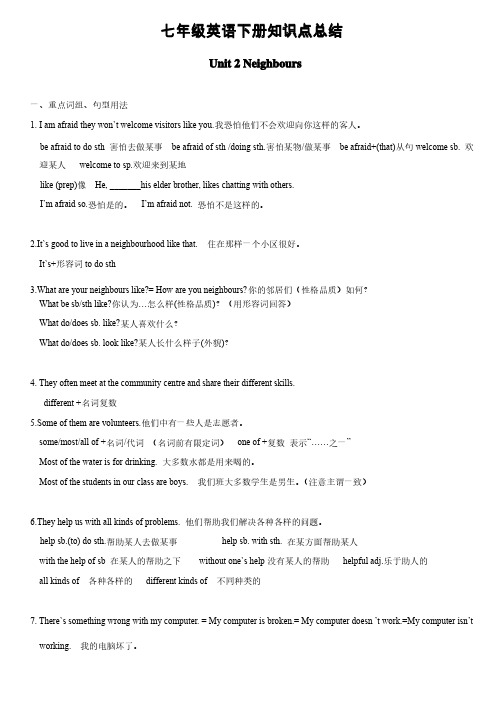
七年级英语下册知识点总结Unit 2 Neighbours一、重点词组、句型用法一、重点词组、句型用法1. I am afraid they won`t welcome visitors like you.我恐怕他们不会欢迎向你这样的客人。
我恐怕他们不会欢迎向你这样的客人。
be afraid to do sth 害怕去做某事害怕去做某事 be afraid of sth /doing sth.害怕某物/做某事做某事be afraid+(that)从句welcome sb. 欢迎某人迎某人 welcome to sp.欢迎来到某地欢迎来到某地like (prep)像He, _______his elder brother, likes chatting with others. I’m afraid so.恐怕是的。
恐怕是的。
I’m afraid not. 恐怕不是这样的。
恐怕不是这样的。
2.It`s good to live in a neighbourhood like that. 住在那样一个小区很好。
住在那样一个小区很好。
It`s+形容词to do sth3.What are your neighbours like?= How are you neighbours?你的邻居们(性格品质)如何?你的邻居们(性格品质)如何?What be sb/sth like?你认为…怎么样(性格品质)?(用形容词回答)?(用形容词回答)What do/does sb. like?某人喜欢什么?某人喜欢什么?What do/does sb. look like?某人长什么样子(外貌)?4. They often meet at the community centre and share their different skills.different +名词复数名词复数5.Some of them are volunteers.他们中有一些人是志愿者。
七年级英语下册第二单元知识点归纳Unit2单元归纳

Unit 2 What time do you go to school 单元归纳短语归纳1.what time 几点2.go to school 去上学3.get up 起床4.take a shower 洗淋浴5.brush teeth 刷牙6.get to 到达7.do homework 做家庭作业8.go to work 去上班9.go home 回家10.eat breakfast 吃早饭11.get dressed 穿上衣服12.get home 到家13.either…or…要么…要么…14.go to bed 上床睡觉15.in the morning/ afternoon/ evening在上午/下午/晚上16.take a walk 散步17.lots of 许多,大量18.radio station 广播电台19.at night 在晚上20.be late for 迟到用法集萃1.at + 具体时间点在几点(几分)2.eat breakfast/ lunch/dinner吃早饭/午饭/晚饭3.take a(n) +名词从事(……)活动4.half past +基数词……点半5. a quarter to +基数词差一刻到……点6.from …to …从……到……7.need to do sth 需要做某事典句必背1. What time do you usually get upI usually get up at six thirty.2. That’s a funny time for breakfast.3. When do students uasually eat dinnerThey usually eat dinner at a quarter to seven in the evening.4. In the evening, I either watch TV or play computer games.5. At twelve,she eats lots of fruit and vegetables for lunch..6. She knows it’s not good for her, but it tastes good.7. Here are your clothes.佳作赏析主题:谈论日常作息习惯写作思路:按照时间顺序记叙一个人的日常作息习惯,必须注意时间的先后顺序,以及时间的表达方式,可以适当运用一些表示频率的副词。
人教七年级下册英语unit2知识点总结
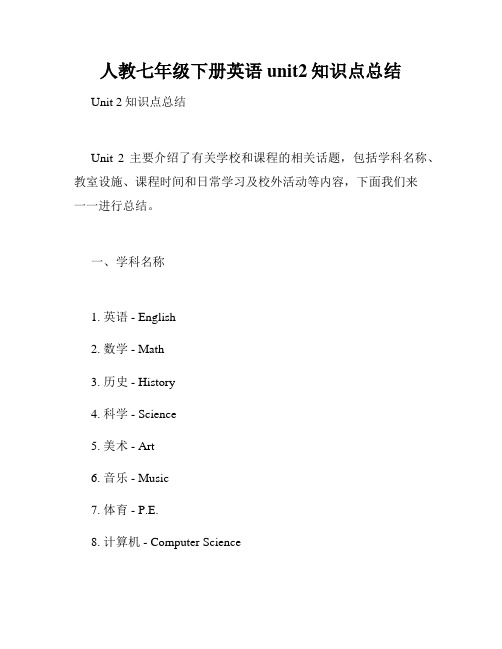
人教七年级下册英语unit2知识点总结Unit 2知识点总结Unit 2主要介绍了有关学校和课程的相关话题,包括学科名称、教室设施、课程时间和日常学习及校外活动等内容,下面我们来一一进行总结。
一、学科名称1. 英语 - English2. 数学 - Math3. 历史 - History4. 科学 - Science5. 美术 - Art6. 音乐 - Music7. 体育 - P.E.8. 计算机 - Computer Science二、教室设施1. 黑板 - blackboard2. 白板 - whiteboard3. 投影仪 - projector4. 音响 - sound system5. 地图 - map6. 水龙头 - tap7. 电视 - TV8. 电脑 - computer9. 灯 - light10. 窗户 - window三、课程时间1. 上午 - in the morning2. 下午 - in the afternoon3. 晚上 - in the evening4. 早上 - in the early morning5. 夜晚 - at night6. 每周 - every week7. 每天 - every day8. 周末 - on weekends四、日常学习1. 做作业 - do homework2. 练习 - practice3. 复习 - review4. 读书 - read books5. 写作 - write compositions6. 讨论 - have discussions7. 板书笔记 - take notes8. 教师讲解 - teacher's explanation9. 学习笔记 - study notes10. 做练习 - do exercises五、校外活动1. 课外活动 - extracurricular activities2. 运动会 - sports meeting3. 聚会 - party4. 社交活动 - social activities5. 英语角 - English corner6. 爱好小组 - hobby group7. 社团活动 - club activities8. 学校之旅 - school trip以上就是Unit 2的主要内容,希望能够帮助大家更好地学习英语,更好地了解学校和课程的相关话题。
七年级英语人教版下册Unit2重点知识点归纳
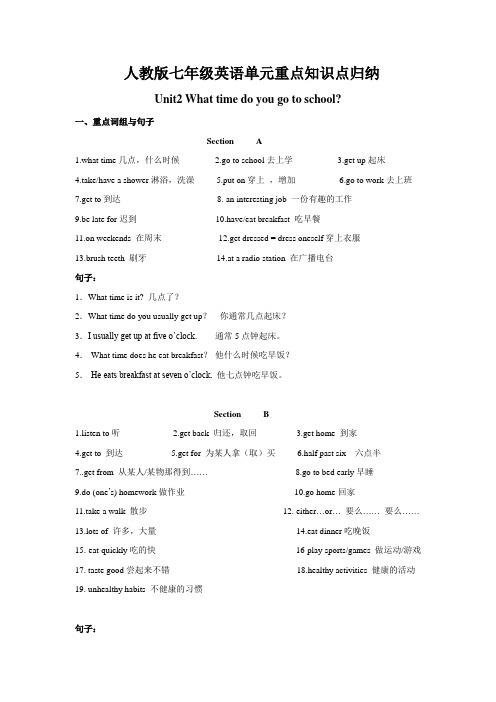
人教版七年级英语单元重点知识点归纳Unit2 What time do you go to school?一、重点词组与句子Section A1.what time几点,什么时候2.go to school去上学3.get up起床4.take/have a shower淋浴,洗澡5.put on穿上,增加6.go to work去上班7.get to到达8. an interesting job 一份有趣的工作9.be late for迟到10.have/eat breakfast 吃早餐11.on weekends 在周末12.get dressed = dress oneself穿上衣服13.brush teeth 刷牙14.at a radio station 在广播电台句子:1.What time is it? 几点了?2.What time do you usually get up?你通常几点起床?3.I usually get up at five o’clock. 通常5点钟起床。
4.-What time does he eat breakfast?他什么时候吃早饭?5.-He eats breakfast at seven o’clock. 他七点钟吃早饭。
Section B1.listen to听2.get back 归还,取回3.get home 到家4.get to 到达5.get for 为某人拿(取)买6.half past six 六点半7..get from 从某人/某物那得到……8.go to bed early早睡9.do (one’s) homework做作业10.go home回家11.take a walk 散步12. either…or…要么……要么……13.lots of 许多,大量14.eat dinner吃晚饭15. eat quickly吃的快16 play sports/games 做运动/游戏17. taste good尝起来不错18.healthy activities 健康的活动19. unhealthy habits 不健康的习惯句子:1.When do students usually eat dinner?学生们通常什么时候吃晚餐?2.I don’t have much time for breakfast.我没有许多时间吃早餐。
人教版七年级下册英语Unit-2单元知识点复习
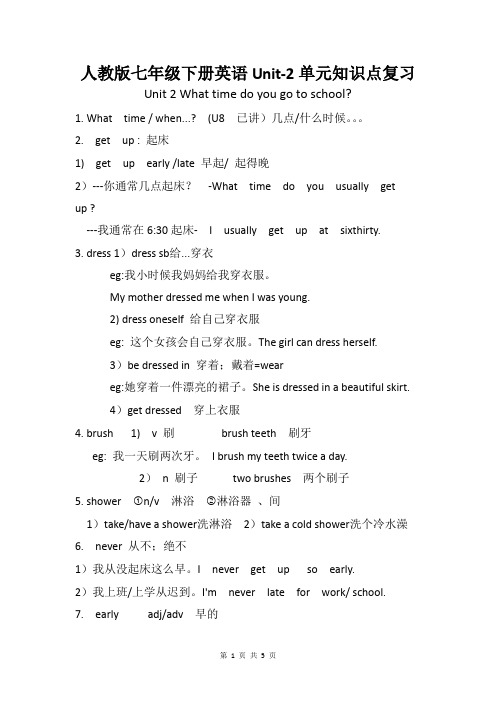
人教版七年级下册英语Unit-2单元知识点复习Unit 2 What time do you go to school?1. What time / when...? (U8 已讲)几点/什么时候。
2. get up : 起床1) get up early /late 早起/ 起得晚2)---你通常几点起床?-What time do you usually getup ?---我通常在6:30起床- I usually get up at sixthirty.3. dress 1)dress sb给...穿衣eg:我小时候我妈妈给我穿衣服。
My mother dressed me when I was young.2) dress oneself 给自己穿衣服eg: 这个女孩会自己穿衣服。
The girl can dress herself.3)be dressed in 穿着;戴着=weareg:她穿着一件漂亮的裙子。
She is dressed in a beautiful skirt.4)get dressed 穿上衣服4. brush 1) v 刷brush teeth 刷牙eg: 我一天刷两次牙。
I brush my teeth twice a day.2)n 刷子two brushes 两个刷子5. shower ①n/v 淋浴②淋浴器、间1)take/have a shower洗淋浴2)take a cold shower洗个冷水澡6. never 从不;绝不1)我从没起床这么早。
I never get up so early.2)我上班/上学从迟到。
I'm never late for work/ school.7. early adj/adv 早的1) catch the early bus赶早班车2) The early bird catch而是the worm.早起的鸟儿有虫吃。
七年级下英语unit2知识点归纳

七年级下英语unit2知识点归纳Unit2是一学期英语课程中重要的一部分,本单元主要介绍了一些基础的英语语法和词汇。
下面我们来对Unit2的知识点做个简单的归纳。
一、情态动词情态动词是英语语法中很重要的一部分,它们可以用于表达某种根据语境而定的情态语气。
在Unit2中,我们学习了“can”和“must”这两种情态动词。
它们分别表示能力和必须做的事情。
例如:1. I can swim.(我会游泳。
)2. We must do our homework now.(我们现在必须做我们的作业了。
)二、短语动词短语动词是由一个动词和一个或多个介词、副词、副动词等组成的短语,它们的意思与单独使用该动词时有所不同。
在Unit2中,我们学习了“look after”和“come back”这两个短语动词。
例如:1. Who will look after the dogs when we are away?(我们离开时,谁会照看这些狗?)2. Jack will come back at 5 o'clock.(杰克将在5点钟回来。
)三、反意疑问句反意疑问句是由一个陈述句和一个短语构成,用于表达询问或确认。
通常反意疑问句的意思与其所在的陈述句产生反义关系。
在Unit2中,我们学习了如何构建反意疑问句。
例如:1. You don't like coffee, do you?(你不喜欢咖啡,是吗?)2. Your father is a doctor, isn't he?(你的父亲是医生,对吗?)四、一般过去时态一般过去时态是用于表达已经发生的动作或事件的时间。
在Unit2中,我们学习了如何构建一般过去时态。
例如:1. I studied English last night.(我昨晚学习了英语。
)2. They visited Shanghai last year.(他们去年访问了上海。
)五、名词名词是用于表示某种事物、人或想象的概念的词语。
人教版七年级英语下 Unit2 知识点语法归纳总结
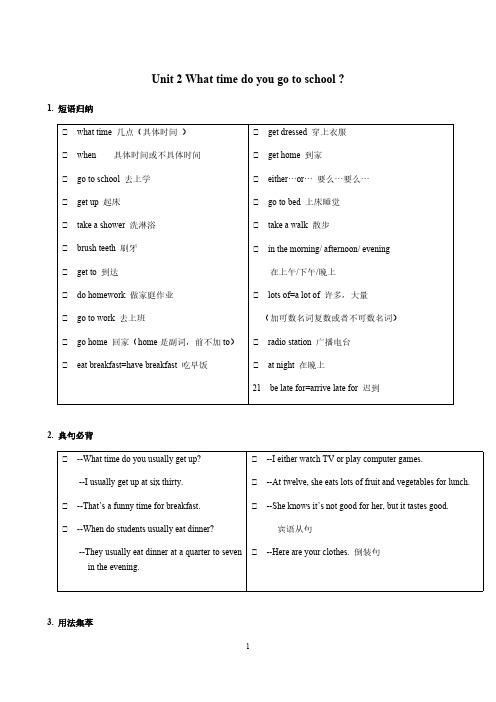
Unit 2 What time do you go to school ?1.短语归纳①what time 几点(具体时间)①when具体时间或不具体时间①go to school 去上学①get up 起床①take a shower 洗淋浴①brush teeth 刷牙①get to 到达①do homework 做家庭作业①go to work 去上班①go home 回家(home是副词,前不加to)①eat breakfast=have breakfast 吃早饭①get dressed 穿上衣服①get home 到家①either…or…要么…要么…①go to bed 上床睡觉①take a walk 散步①in the morning/ afternoon/ evening在上午/下午/晚上①lots of=a lot of 许多,大量(加可数名词复数或者不可数名词)①radio station 广播电台①at night 在晚上21 be late for=arrive late for 迟到2.典句必背①--What time do you usually get up?--I usually get up at six thirty.①--That’s a funny time for breakfast.①--When do students usually eat dinner?--They usually eat dinner at a quarter to sevenin the evening. ①--I either watch TV or play computer games.①--At twelve, she eats lots of fruit and vegetables for lunch.①--She knows it’s not good for her, but it tastes good.宾语从句①--Here are your clothes. 倒装句3.用法集萃(1)What time do you usually get up , Rick?①频度副词:表示动作频率的副词辨析:always, usually, often, sometimes, seldom, never频度频度副词含义举例always一直;总是The sun always rises in the east and sets in the west.太阳总是东升西落usually通常I usually ask my father for help. 我通常会向我爸爸求助often经常It often rains here in April. 这儿四月份常下雨sometimes有时;不时I sometimes wait for him at the school gate.我有时在学校大门口等他seldom/hardly/hardly/ever很少;几乎不I don’t like swimming, so I seldom go swimming.我不喜欢游泳,所以我很少去游泳频率由高到低never从不;从来没有I never tell lies. 我从不说谎①常见的get 短语get up 起床;站起get back 回来get on 上车get out 出去get off 下车get to 到达get dressed 穿上衣服get married 结婚get together 相聚;聚会get ready (for) (为...)做好准备(2)辨析 get dressed 与 be dressed in①get dressed 表示“穿”的动作①be dressed in 表示“穿”的状态①拓展:dress, put on, wear, be indress其后可跟表示人的名词或代词,意为“给...穿衣服”She can dress herself.她会自己穿衣服put on意为“穿上;戴上”,强调“穿、戴”的动作You’d better put on your coat.你最好穿上你的外套wear意为“穿着;戴着”,强调“穿、戴”的状态She is wearing a beautiful evening dress.她穿着一件漂亮的晚礼服be in其后可跟衣服或颜色类的词汇,也表示“穿、戴”的状态The girl in red is my sister.那个穿红色衣服的是我的妹妹(3)辨析:at, in,on→I usually get up at six thirty.at at和时间点搭配,还可以和noon,night等搭配at nine o’clock/at nightin in和年、月、季节搭配,还可以和morning,evening等搭配in July/in summer/in the morning on on和星期、日期搭配,还可以表示在具体某一天的上午、下午或晚上on Sunday/on June 1st(4)exercise的用法→ After that, I usually exercise at about ten twenty.那之后我通常在10点20分左右锻炼身体①作动词,意为“锻炼”,可作及物动词,也可作不及物动词例:How often do you exercise? 你多久锻炼一次?He exercises his body every day. 他每天锻炼身体。
人教版七年级英语下册第二单元知识点归纳总结Unit-2
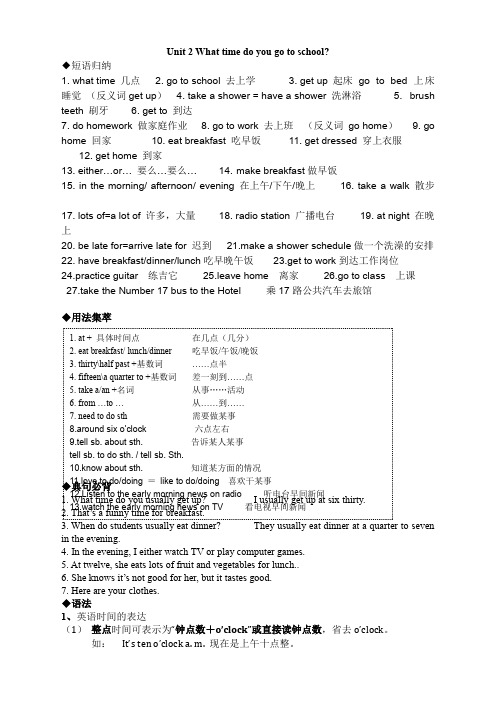
Unit 2 What time do you go to school?◆短语归纳1. what time 几点2. go to school 去上学3. get up 起床 go to bed 上床睡觉 (反义词get up )4. take a shower = have a shower 洗淋浴5. brush teeth 刷牙6. get to 到达7. do homework 做家庭作业 8. go to work 去上班 (反义词 go home ) 9. go home 回家 10. eat breakfast 吃早饭 11. get dressed 穿上衣服12. get home 到家13. either…or… 要么…要么… 14. make breakfast 做早饭15. in the morning/ afternoon/ evening 在上午/下午/晚上 16. take a walk 散步17. lots of=a lot of 许多,大量 18. radio station 广播电台 19. at night 在晚上20. be late for=arrive late for 迟到 21.make a shower schedule 做一个洗澡的安排22. have breakfast/dinner/lunch 吃早晚午饭 23.get to work 到达工作岗位24.practice guitar 练吉它 25.leave home 离家 26.go to class 上课27.take the Number 17 bus to the Hotel 乘17路公共汽车去旅馆◆用法集萃 ◆典句必背 1. What time do you usually get up? I usually get up at six thirty. 2. That’s a funny time for breakfast. in the evening.4. In the evening, I either watch TV or play computer games.5. At twelve, she eats lots of fruit and vegetables for lunch..6. She knows it’s not good for her, but it tastes good.7. Here are your clothes.◆语法1、英语时间的表达(1) 整点时间可表示为“钟点数+o’clock”或直接读钟点数,省去o’clock 。
初一下册英语第二单元知识点总结归纳

初一下册英语第二单元知识点总结归纳摘要:一、重点句型及回答1.询问喜好和习惯的句型:What do you like to do? / What habits do you have?2.描述他人喜好的句型:He/She likes to do sth./ He/She has the habit of doing sth.3.表达喜好的回答:I like / I don"t like4.表达习惯的回答:I have the habit of doing sth.二、疑问词和回答1.询问时间:What time do you ...?回答:I usually ...at .../ I often ...at ...2.询问地点:Where do you ...?回答:I ...at .../ I ...in ...三、日常用语和场景1.早上问候:Good morning!2.介绍:Hello, this is .../ Nice to meet you.3.感谢:Thank you / You"re welcome4.告别:Goodbye / See you later四、重点词汇1.学科:math / science / English / physical education2.日常活动:play sports / listen to music / read books / watch TV3.食物和饮料:hamburgers / hot dogs / pizza / juice / coffee正文:初一下册英语第二单元主要涵盖了日常交际用语、疑问词询问、表达喜好和习惯的句型以及日常场景对话等内容。
以下是对这些知识点的详细总结:一、重点句型及回答1.询问喜好和习惯的句型:What do you like to do? / What habits do you have?回答:I like playing sports./ I have the habit of reading books.2.描述他人喜好的句型:He/She likes to do sth./ He/She has the habit of doing sth.例如:My brother likes playing video games./ My sister has the habit of waking up early.3.表达喜好的回答:I like / I don"t like例如:I like pizza./ I don"t like coffee.4.表达习惯的回答:I have the habit of doing sth.例如:I have the habit of exercising every day.二、疑问词和回答1.询问时间:What time do you start school?回答:I start school at 7:30./ I usually start school at 7:30.2.询问地点:Where do you live?回答:I live in a apartment./ I live near the supermarket.三、日常用语和场景1.早上问候:Good morning, classmates!2.介绍:Hello, this is my new friend, Lisa./ Nice to meet you, Lisa.3.感谢:Thank you for helping me./ You"re welcome.4.告别:Goodbye, see you later! / See you tomorrow, classmates!四、重点词汇1.学科:math / science / English / physical education例如:My favorite subject is math./ She is good at English.2.日常活动:play sports / listen to music / read books / watch TV例如:I play soccer after school./ She likes to listen to music in her free time.3.食物和饮料:hamburgers / hot dogs / pizza / juice / coffee例如:My favorite food is pizza./ I drink coffee in the morning.通过学习初一下册英语第二单元的知识点,我们可以在日常生活中更好地与他人进行交流,了解彼此的喜好和习惯。
人教版七年级英语下册Unit 2 What time do you go to school知识点归纳总结

Unit 2 What time do you go to school?◆短语归纳1. what time 几点2. go to school 去上学3. get up 起床 go to bed 上床睡觉(反义词get up )4. take a shower = have a shower 洗淋浴5. brush teeth 刷牙6. get to 到达7. do homework 做家庭作业 8. go to work 去上班(反义词 go home )9. go home 回家 10. eat breakfast 吃早饭 11. get dressed 穿上衣服12. get home 到家13. either…or… 要么…要么… 14. make breakfast 做早饭15. in the morning/ afternoon/ evening 在上午/下午/晚上 16. take a walk 散步17. lots of=a lot of 许多,大量 18. radio station 广播电台 19. at night 在晚上20. be late for=arrive late for 迟到21.make a shower schedule 做一个洗澡的安排22. have breakfast/dinner/lunch 吃早晚午饭 23.get to work 到达工作岗位24.practice guitar 练吉它25.leave home 离家26.go to class 上课27.take the Number 17 bus to the Hotel 乘17路公共汽车去旅馆◆用法集萃 ◆典句必背 1. What time do you usually get up? I usually get up at six thirty. 2. That’s a funny time for breakfast. 3. When do students usually eat dinner? They usually eat dinner at a quarter to seven in the evening.4. In the evening, I either watch TV or play computer games.5. At twelve, she eats lots of fruit and vegetables for lunch..6. She knows it’s not good for her, but it tastes good.7. Here are your clothes.◆语法1. at + 具体时间点 在几点(几分)2. eat breakfast/ lunch/dinner 吃早饭/午饭/晚饭3. thirty\half past +基数词 ……点半4. fifteen\a quarter to +基数词 差一刻到……点5. take a/an +名词 从事……活动6. from …to … 从……到……7. need to do sth 需要做某事8.around six o’clock 六点左右9.tell sb. about sth. 告诉某人某事 tell sb. to do sth. / tell sb. Sth. 10.know about sth. 知道某方面的情况 11.love to do/doing = like to do/doing 喜欢干某事 12.Listen to the early morning news on radio 听电台早间新闻 13.watch the early morning news on TV 看电视早间新闻1、英语时间的表达(1)整点时间可表示为“钟点数+o’clock”或直接读钟点数,省去o’clock。
七年级英语下Unit 2 知识点归纳与复习人教新目标版

新目标七年级下Unit 2 知识点归纳与复习单元知识清单一、重点单词:1. libr r 图书馆2. rest rant 餐馆3. superm ket 超市4. str t 街道5. p k 公园6. c nt 中心7. br ge 桥8. n 在……附近9. acr 横过10. n xt 贴近11. betw n 在两者之间12. fr nt 前面13. t n 转弯14. l ft 左边15. r t 右边16. cl n 清洁的17. qu t 宁静的18. d ty 肮脏的19. h se 房子20. welc m 欢迎21. g den 花园22. enj 欣赏23. w k 散步24. thr 穿过25. begin 开始26. t 旅行27. v s t 参观28. pl ce 地方29. h gry 饥饿的30. a ive 到达31. w 路线32. t ke 乘, 坐33. t x 出租车34. airp t 飞机场35. p ss 通过36. h pe 希望二、必会短语1. post 邮局2. phone 投币式公用电话3. in of 在……前面4. on 在右边5. take 散步6. fun 玩得开心7. turn 向左转8. across 在……对面9. take 坐出租车10. have a 旅途愉快三、应知语法和句式:1. 表示在某地有某物用there be。
如:在这附近有一家银行。
a bank near here.2. There de 的一般问句是将be放到there的前面。
如:有一个超市吗?a supermarket?肯定回答是:Y es, .否定回答是:No, .3. 本课学习的两种问路方式:一种是:用Is there …? 如:在这附近有公用电话吗?a pay phone near here?另一种是:用Where is the …? 如:图书馆在哪?the library?4. welcome to …表示欢迎到某地。
人教版七年级下册英语Unit2知识点归纳总结和练习(含答案)

Unit2 What time do you go to school?一、词汇集锦get up_______ dress________ get dressed_______ brush________ tooth (pl. teeth)________ shower ______ take a shower_______ usually _______ forty________ never ________ early_______ fifty ________job______ work _______ station_________ radio station__________ o'clock______ night ________ funny________ exercise__________on weekends_________ best _________ group ________ half___________ past _________ quarter __________ homework_______ do (one's) homework _________ run_________ clean__________ walk _________ take a walk________quickly ________ either _________ either…or… _________ lots of ___________ sometimes __________ taste __________ life ________二、短语归纳1. go to school 去上学2. get up 起床3. get dressed 穿衣服4. brush teeth 刷牙5. eat breakfast 吃早饭6. take a shower 洗澡7. what time 什么时间8. at six forty 在六点四十9. an interesting job 一个有趣的工作10. at the radio station 在广播电视台11. usually /always/ often/ sometimes/ never 经常/总是/经常/有时/从不12. your radio show 你的广播节目13. from …..to 从….到…..14. at night 在夜晚15. a funny time 一个有趣的时间16. take exercise 锻炼17. be late for….. 因…迟到18. at about ten twenty 在大约十点二十19. on weekends 在周末20. on school days 在上学日21. half past six 六点半22. a quarter past three 三点过一刻(3:15)23. a quarter to ten 十点差一刻(9:45)24. do (one’s)homework 做(某人的)家庭作业25. take a walk 散步26. go to bed 睡觉27. eat quickly 吃得快28. have much time 有许多时间29. half an hour 半个小时30. get home 到达家31. either…..or 或者…….或者......32. eat a good breakfast 好好吃顿早餐33. lots of = a lot of 许多34. be good for….. 对…….有益35. taste good 尝起来好36. do her homework 做她的家庭作业37. have a healthy life 有一个健康的生活方式38. have dinner 吃晚饭三、句型展示1. What time do you go to school?你几点去上学?2. 一What time do you usually take a shower,Kick?瑞克,你通常几点钟淋浴?—I usually take a shower at six forty.我通常六点四十淋浴。
七下英语二单元语法

七下英语二单元语法
摘要:
一、七年级下册英语第二单元语法概述
1.单元主题
2.语法知识点
二、动词的一般现在时
1.动词的一般现在时构成
2.一般现在时的疑问句与否定句
三、动词的一般过去时
1.动词的一般过去时构成
2.一般过去时的疑问句与否定句
四、情态动词can的用法
1.can的肯定句与否定句
2.can的一般疑问句
五、日常交际用语
1.问候与介绍
2.道别与应答
正文:
七年级下册英语第二单元语法主要涉及动词的一般现在时、一般过去时以及情态动词can的用法,同时学习日常交际用语。
首先,本单元的主题是关于日常交际,通过学习不同场景下的问候、介
绍、道别等用语,提高学生的口语表达能力。
在此基础上,本单元还涉及动词的一般现在时和一般过去时,帮助学生更好地描述动作的发生时间。
在动词时态方面,一般现在时表示现在的习惯、事实或一般情况。
其构成是动词原形,如:I study English every day.一般过去时则表示过去某个特定时间发生的动作,其构成是动词过去式,如:I studied English yesterday.在学习这两个时态时,学生还需掌握疑问句和否定句的构成方法。
此外,本单元还讲解了情态动词can的用法。
can表示能力或允许,用于疑问句时,用can you提问;用于否定句时,用can"t表示不能,如:I can"t swim.对于can的一般疑问句,疑问部分用can you,肯定回答为Yes,I can;否定回答为No,I can"t。
七年级英语下册Unit 2知识点总结
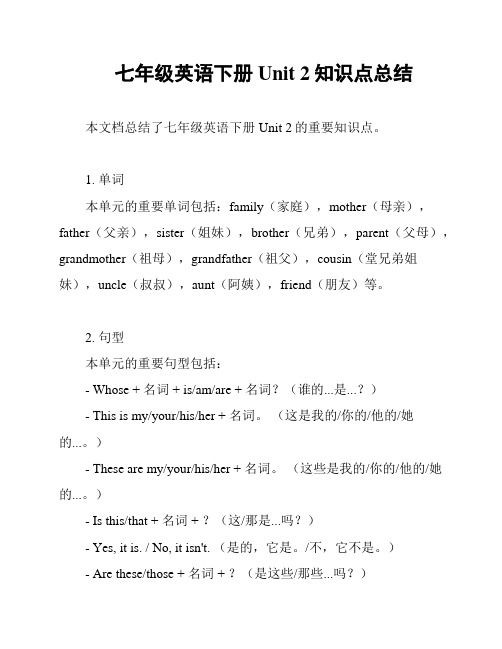
七年级英语下册Unit 2知识点总结本文档总结了七年级英语下册Unit 2的重要知识点。
1. 单词本单元的重要单词包括:family(家庭),mother(母亲),father(父亲),sister(姐妹),brother(兄弟),parent(父母),grandmother(祖母),grandfather(祖父),cousin(堂兄弟姐妹),uncle(叔叔),aunt(阿姨),friend(朋友)等。
2. 句型本单元的重要句型包括:- Whose + 名词 + is/am/are + 名词?(谁的...是...?)- This is my/your/his/her + 名词。
(这是我的/你的/他的/她的...。
)- These are my/your/his/her + 名词。
(这些是我的/你的/他的/她的...。
)- Is this/that + 名词 + ?(这/那是...吗?)- Yes, it is. / No, it isn't. (是的,它是。
/不,它不是。
)- Are these/those + 名词 + ?(是这些/那些...吗?)- Yes, they are. / No, they aren't. (是的,他们是。
/不,他们不是。
)3. 语法本单元的重要语法点包括:- The possessive case(所有格)- 形容词性物主代词:my(我的),your(你的),his(他的),her(她的),its(它的),our(我们的),their(他们的)- 名词性物主代词:mine(我的),yours(你的),his(他的),hers(她的),its(它的),ours(我们的),theirs(他们的)4. 对话和情景本单元的对话和情景练了与家庭成员、亲戚和朋友的介绍和问候用语,以及询问关系和提供答案的表达。
5. 阅读理解和写作本单元包括了相关的阅读理解和写作练,内容涉及个人介绍、家庭成员和亲戚的介绍等。
- 1、下载文档前请自行甄别文档内容的完整性,平台不提供额外的编辑、内容补充、找答案等附加服务。
- 2、"仅部分预览"的文档,不可在线预览部分如存在完整性等问题,可反馈申请退款(可完整预览的文档不适用该条件!)。
- 3、如文档侵犯您的权益,请联系客服反馈,我们会尽快为您处理(人工客服工作时间:9:00-18:30)。
学习资料Unit 2单元归纳短语归纳1.what time 几点2.go to school 去上学3.get up 起床4.take a shower 洗淋浴5.brush teeth 刷牙6.get to 到达7.do homework 做家庭作业8.go to work 去上班9.go home 回家10.eat breakfast 吃早饭11.get dressed 穿上衣服12.get home 到家13.either…or…要么…要么…14.go to bed 上床睡觉15.in the morning/ afternoon/ evening 在上午/下午/晚上16.take a walk 散步17.lots of 许多,大量18.radio station 广播电台19.at night 在晚上20.be late for 迟到用法集萃1.at + 具体时间点在几点(几分)2.eat breakfast/ lunch/dinner吃早饭/午饭/晚饭3.take a(n) +名词从事(……)活动4.half past +基数词……点半5. a quarter to +基数词差一刻到……点6.from …to …从……到……7.need to do sth 需要做某事佳作赏析主题:谈论日常作息习惯写作思路:按照时间顺序记叙一个人的日常作息习惯,必须注意时间的先后顺序,以及时间的表达方式,可以适当运用一些表示频率的副词。
例文:My School DayI am a student. I usually get up at seven, and I eat breakfast at seven thirty. Then I go to school at eight. School starts at eight thirty. I eat lunch at twelve. I go home at 17:00. I often eat dinner at 19:00 and then play the piano. I do my homework at 20:00. At 22:00, I go to bed.Unit2 单元测试题Grade________ Name ________Ⅰ.选择填空。
1. ―What's the time? ―_____half past nine. A. Its B. It's C. This is D. They're2. We go to ___ at six thirty in the morning. A. the school B. a school C. school D. schools3. —___ does your mother work? —In a school.A. What B. How C. Where D. When4. —What time is it? —It's ____eight o'clock. A. at B. on C. in D. around5. Do you want to listen to the _____ story?A. funnily B. funny C. funy D. funer6 What time does Jane ______ after school?A. do her homeworkB. does her homeworkC. do her homeworksD. does her homeworks7. I ___ at ten o'clock in the evening.A. have breakfastB. get upC. go to bedD. watch morning TV8.He eats ____ dinner at 7:30 in the evening. A. a B. an C. the D. /9. Please write and tell me ______ your morning. A. for B. to C. about D. of10. ____ Lucy and Lily go home at seven? A. Do B. Does C. Is D. Are11. It's ten o'clock. I must go ____. A. to home B. home C. my home D. his home12. I want to take_________ shower. A. a B. an C. the D. one13. My sister ____ home at 5:00 every day. A. gets B. gets to C. get D. get to14. We can __ No. 5 bus to Tian'an Men Square.A. get B. come C. go D. take15. ---Will you go there by_____train? ----No,, I’ll take ______ taxi.A. /;aB. a;theC./;/D. the;a16We only have h Beijing Opera _____ TV. A. in B. at C. on D. from17. Let’s ______.A. take a shower B. have a shower C. take the shower D. A and B18. My brother ___ the morning TV every day. A. watches B. watch C. watchs D. see19. Do you know__?A. what is his jobB. what does his jobC.what his job does D.what his job is20. He likes ___ the radio(收音机)。
A. listens B. to listen to C. listens to D. to listenII、完形填空Today is Monday (周一). We have a(n) 1 class in the morning. It 2 at 8:30, but I am late (迟到的) for it. I often3 school at about 7:50,4 today I get there late. At about nine o’clock I get to the classroom. I’m really 5 . My English teacher, Miss Green is very kind to me. She 6 me in and doesn’t cri ticize (批评) me. How nice she is!All the students 7 my class like Miss Green. I have many subjects at8 : math, English, P. E., music, 9and computer, but I like English10 . I like my English teacher and I like her classes. I’ll never (不再) get to school la te. I’ll get up very early (早) in the morning.( )1. A. math B. art C. music D. English( )2 A. goes B. starts C. shows D. works( )3. A. learn about B. look at C. get to D. work in( )4. A. or B. and C. after D. but( )5. A. sorry B. exciting C. good D. happy( )6 A. likes B. meets C. lets D. joins( )7. A. on B. in C. for D. about( )8. A. store B. home C. school D. party( )9 A. Chinese B. letter C. festival D. action( )10. A. little B. best C. too D. wellIII、阅读理解 A 难度:★This is Wang Ping’s Day. He’s a young worker. His job is carrying coal (( )1. When does Wang Ping have breakfast? A. At 5:20 in the morning.B. At 5:10 in the afternoon.C. At 5:40 in the morning.D. At 6:00 in the afternoon.( )2. Where does he have his breakfast?A. At home.B. In the coal mine(煤矿).C. In the restaurant(餐馆).D. In the factory (工厂). ( )3. Wang Ping watches news ______.A. over the radioB. on TV in the morning every day D. every morning( )4. Wang Ping goes home _______.A.at 7:40 every eveningB. at 5:20 every eveningC.at 7:30 every morningD. at 5:20 every morning( )5. --- How old is Wang Ping? --- _______.A. A bout 50B. About fifteenC. 25D. We don’t knowB 难度:★★In my family, there are my parents, my grandparents, my brother and I. We are a happy family. My father is a teacher. He works in a school. He gets up early and works very hard every day. Sometimes he helps me with my homework. His students love him very much because he likes to help them. My mother is a writer. She doesn’t need to go to work but she writes books, cleans (打扫) the house and takes care of (照顾) us. My grandparents are old. T hey don’t have jobs. They stay at home every day, reading newspapers (读报) and watching TV. They go to bed early. My brother is a student. He is in my school, too. He likes playing basketball, tennis and ping-pong. I like to play soccer, ping-pong and computer games. After school, we get home early. We do our homework, play sports and help our parents in the evening.( )1. There are ______ people in the f amily.A. five B. six C. seven D. eight( )2. My brother is a ______.A. writer B. runner C. student D. teacher( )3. My mother works ______.A. in a school B. in a hotel C. in a store D. at home( )4. My grandparents ______.A. help us with our homework B. write booksC. don’t have jobsD. don’t like watching TV( )5. My brother and I both (都) like playing ______.A. basketballB. soccerC. tennisD. ping-pongIII 根据句意写单词, 首字母已给出。
